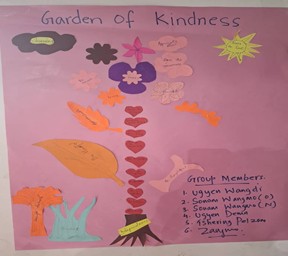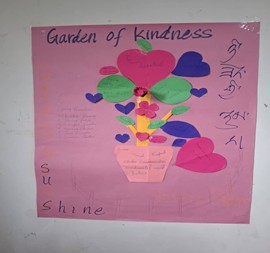On 22nd August 2025, Peljorling Higher Secondary School (PHSS) hosted a day-long Capacity Building Workshop on Gender Equality and Social Inclusion (GESI), organised by the GESI Project of Samtse College of Education (SCE). The initiative is part of a collaborative research effort with Kathmandu University (Nepal), RDRS (Bangladesh), and SCE, supported by the Global Partnership for Education Knowledge and Innovation Exchange (GPE KIX) and the International Development Research Centre (IDRC).
A total of 89 teachers, including the Principal, participated in the workshop, which was facilitated jointly by two SCE faculty and two GESI focal teachers from PHSS. The workshop aimed to introduce the Children’s Valued Educational Capabilities (CVEC) framework, equip teachers with strategies to embed GESI principles in classrooms, and familiarise them with the LIKE Club Manual, designed to foster socio-emotional well-being and inclusivity.
The programme began with a traditional opening ceremony, including the lighting of butter lamps and singing of the Gyalpoi Zhapten, followed by welcoming and opening remarks from school leaders. A major milestone was the launch of the school’s LIKE Club, reinforcing the commitment to nurturing inclusive values and holistic student development.
Teachers participated in a series of interactive activities designed to promote empathy, collaboration, and inclusion:
- Simulated Mobility and Visual Impairments: Participants experienced challenges faced by differently-abled learners, highlighting the importance of clear communication, teamwork, and supportive classroom practices.
- Draw What I See: Teachers explored effective listening, observation, and peer support, while reflecting on the emotional experiences of students, including vulnerability and anxiety.
- Many Colours, One Fabric: This activity emphasised identity, diversity, and collaboration, showing how collective efforts contribute to unity, shared purpose, and inclusion.
Reflections from 12 groups highlighted the value of kindness, emotional regulation, self-esteem, resilience, and the critical role of teachers in fostering safe and inclusive learning environments. Observers noted the significance of accessible infrastructure, differentiated instruction, and peer support in achieving inclusive education outcomes.
Key outcomes of the workshop included practical strategies to support learners’ emotional well-being, enhanced understanding of inclusive teaching approaches, and recognition of the LIKE Club as a platform to strengthen creativity, empathy, and socio-emotional skills among students. Participants described the workshop as practical, engaging, and transformative, with many requesting similar events in the future.
The CVEC Capacity Building Workshop at PHSS demonstrated how inclusive teaching and socio-emotional learning strategies can positively transform classroom culture, providing teachers with actionable tools to ensure that every student feels valued, respected, and supported, reinforcing Bhutan’s commitment to equitable and inclusive education.
Here are a few highlights from the workshop:












